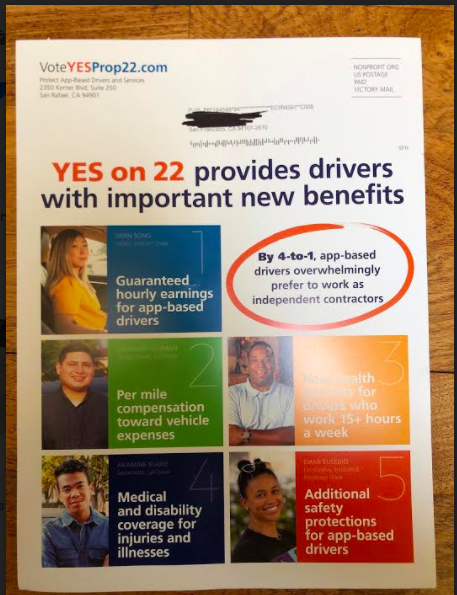The Yes on 22 campaign, funded largely by three giant corporations, has sent out millions of fliers to California voters in the past month – and the opponents of the measure say taxpayers are subsidizing the cost.
The latest Form 460 filings for the Yes on 22 campaign show that, as of September 19, the Yes on 22 campaign has paid $3.5 million in postage for mailing campaign fliers to California homes — about $1.5 million less than they would have paid if they paid regular postage.

That’s because the campaign, funded largely by Uber, Lyft, and DoorDash, claims to be a nonprofit organization.
Nonprofits get about a 30 percent discount on postage, with that 30 percent subsidized by taxpayers.
“Millions of mailers have gone out,” said Mike Roth, spokesperson for the No on 22 campaign. “They were able to save 12 cents per mailer, ripping off the US Postal Service. By any measure, Uber, Lyft, and Doordash and their $200 million corporate campaign is not a non-profit.”
The figure of $1.5 million is likely a conservative estimate as well, seeing as the latest filing is from more than a month ago, and the Yes on 22 campaign’s mailers have been an abiding presence since September 19.
“I’ve never seen anything quite like this,” said Lance Olsen, founder and senior partner at Olsen Remcho LLP, a law firm based in Sacramento that specializes in election law.
Geoff Vetter, spokesperson for the Yes on 22 campaign, said that it is perfectly routine for ballot measure campaign committees to form themselves into non-profits, and the Yes on 22 campaign’s reduced postage for campaign fliers is nothing unusual.
“Campaign committees participating in ballot measure advocacy routinely form themselves as non-profits under section 501(c)(4) of the Internal Revenue Code, as the No on 22 lawyers know well. Furthermore, the IRS granted Yes on 22’s non-profit status,” he said.
“As a 501(c)(4) organization, Yes on 22 is eligible for the appropriate non-profit postage rates with the USPS, which we applied for and were granted by the U.S. Postmaster. Moreover, pursuant to USPS Customer Support Ruling 128 – the USPS has a long-term policy in place of allowing the ballot measure committee of a duly authorized nonprofit to mail under the non-profit’s authorization. The above is true for many ballot measure campaigns, and as stated, like all entities, our applications were reviewed and approved by both the IRS and the USPS.”
Indeed, ballot measure committees are often designated as non-profit entities — but ballot measure campaign committees are normally formed by non-profit organizations, which often already have permits for non-profit reduced rate postage that extend to their campaign committees, according to Olsen. But the Yes on 22 campaign is unique, Olsen said, in that it is three large corporations, each valued at billions of dollars, that have created their own non-profit campaign committee, and used that to acquire the permit to pay reduced postage rates.
“You have three for-profit corporations create a non-profit, and then contributing all the money to the non-profit, and then having the non-profit obtaining a [non-profit] postal permit, one they couldn’t have otherwise obtained since they are for-profit companies… That’s an advantage that they wouldn’t have otherwise gotten if they had spent the money directly. That makes no sense to me…they’ve spent over $3 million, that means they’ve benefited over one million in postal savings, which is completely absurd given that they have contributed, collectively, over $200 million [to the Yes on 22 campaign],” said Olsen.
Olsen sent a letter to the Postmaster General, Louis Dejoy, on Tuesday, demanding that the non-profit postal permit issued to the Yes on 22 campaign be immediately revoked, and threatened legal action if the postal office does not do so by October 28. Olsen claims that the permit was issued unlawfully, saying that the language under USPS guidelines clearly exempt the Yes on 22 campaign.
“The statute [USPS Publication 417, Nonprofit USPS Marketing Mail Eligibility: Nonprofit and Other Qualified Organizations § 2-2 (2017)] specifically and narrowly defines ‘qualified political committee’ as ‘a national or State committee of a political party, the Republican and Democratic Senatorial Campaign Committees, the Democratic National Congressional Committee, and the National Republican Congressional Committee.’ ..Yes on 22 is a registered California political committee, but it is not a political party committee. There is no question it is not a ‘qualified political committee,’ under the postal service definition,” wrote Olsen.
Eric Jaye, a veteran political consultant who is independent of either of the Prop 22 campaigns, said that he was surprised that the Yes on 22 campaign received a non-profit postage permit from the USPS.
“I am very surprised that they got a non-profit permit because the plain reading of the law seems to indicate that they’re not entitled to such,” said Jaye. “The US Postal Service gives state and national party organizations access to non-profit mailing rates. If the Democratic party sends mail on behalf of a Democratic candidate, then that is entitled to the non-profit rate. Campaigns themselves, in my career, which has gone on for a number of decades, have never been entitled to the non-profit rate.”
When it comes down to it, Jaye said he believes that during such unprecedented times, the non-profit postage rate permit being granted to the Yes on 22 campaign could have simply been a mistake as the Post Office and its workers weather the pandemic.
“My reading of the postal regulations, the fact that that [permit] was granted, that was a mistake… in the age of COVID, and with all of the issues that the institutions with the United States and the rest of the world are dealing with, I wouldn’t be surprised if there were a series of errors that wouldn’t have otherwise happened,” said Jaye.
As of yet, I have heard no response from the post office on why they granted the permit to the Yes on 22 campaign.





